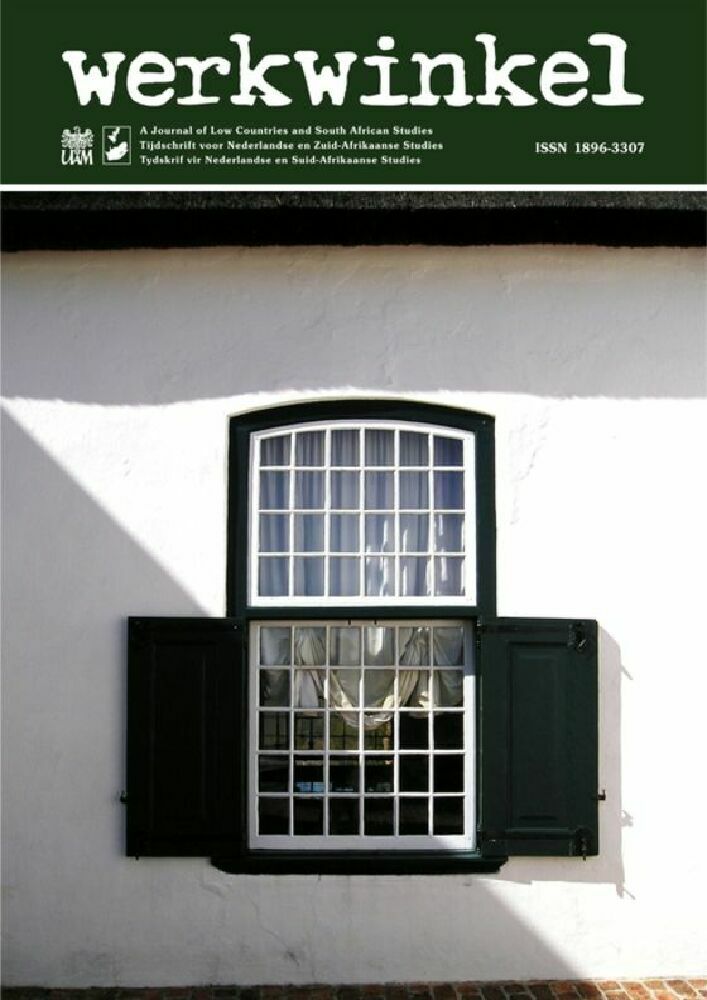Abstract
In writing my article on the poetry of Olga Kirsch I proceed from each poet’s consciousness of the relationship of tension between his humanity and the art he practises. In the case of Olga Kirsch this inner discord was rendered in her humanity. As second recognised Afrikaans woman poet, after Elisabeth Eybers, she was Jewish by birth and English-speaking, although by her own claim Afrikaans, through her environment and school, was stronger than the English of her parental home. In Olga Kirsch’s debut volume Die soeklig (1944) she professes the youthful heart’s restless longing for romantic love in poems still far too trapped in clichéd language. I linger extensively at these so that the great breakthrough of her talent in her second volume, Mure van die hart (1948), can be clearly evident. In strong, stripped-down poems she expresses the Zionistic longing of the Jew in the diaspora for the lost homeland, intensified by the Jewish suffering in the Second World War, with specific reference to the Holocaust in “Die wandelende Jood” and “Koms van die Messias.” After Kirsch’s emigration to Israel in 1948 a silence of twenty-four years followed which was unexpectedly interrupted with the 1972 publication of a thin volume, Negentien gedigte, which impressed especially with “Vyf sonette aan my vader,” which I discuss in detail. In 1975 she visited her native land again and the direct contact with Afrikaans and with the country acted as stimulus for her volume Geil gebied of 1976. The “geil gebied” (fertile area) is a metaphor for the rich subsoil of the poem and for the poem itself. In my discussion of Negentien gedigte and Geil gebied I concentrate on her inner dividedness as being inherently part of her human nature, enhanced by the knowledge that she remained irrevocably attached to her native land and to her Jewish homeland. I point out that the only way she can be healed of this dividedness is by writing her another self in her poems in which she arrives home in both countries, the omnipresence of God and the presence of the beloved husband. Lastly I indicate Olga Kirsch’s enduring place in the Afrikaans tradition of poetry through her procreative influence on other poets or by the way they relate to her poetry.
References
Bouwer, Alba. 1993. Die afdraand van die dag is kil. Kaapstad: Tafelberg.
Die Bybel. 1933. Vertaling. Eerste uitgawe. Cambridge: Universiteit van Cambridge.
Coetzer, Jeanne. 1979. “Twee digteresse aan die woord.” Die Burger. 14 Augustus 1979. n. pag.
Dekker, G. 1961. Afrikaanse literatuurgeskiedenis. Kaapstad: Nasionale Boekhandel.
Eybers, Elisabeth. 1948. The Quiet Adventure. Johannesburg: Constantia.
Eybers, Elisabeth. 1957. Belydenis in die skemering. 2de druk. Kaapstad: Nasionale Boekhandel.
Eybers, Elisabeth. 1995. Versamelde gedigte. Kaapstad: Human & Rousseau.
Hoffman, Eva. 2005. After Such Knowledge: A Meditation on the Aftermath of the Holocaust. Londen: Vintage.
Kannemeyer, J.C. 1983. Geskiedenis van die Afrikaanse literatuur, Band 2. Kaapstad en Pretoria: Academica.
Kannemeyer, J.C. 2005. Die Afrikaanse literatuur 1652-2004. Kaapstad en Pretoria: Human & Rousseau.
Kirsch, Olga. 1944. Die soeklig. Pretoria: J.L. Van Schaik Bpk.
Kirsch, Olga. 1980. Mure van die hart. 2de druk. Johannesburg: Perskor Uitgewery.
Kirsch, Olga. 1972. Negentien gedigte. Kaapstad: Human & Rousseau.
Kirsch, Olga. 1976. Geil gebied. Kaapstad: Human & Rousseau.
Kirsch, Olga. 1978. Oorwinteraars in die vreemde. Kaapstad: Human & Rousseau.
Kirsch, Olga. 1982. Afskeide. Kaapstad: Human & Rousseau.
Kirsch, Olga. 1983. Ruie tuin. Kaapstad: Human & Rousseau.
Kirsch, Olga. 1990. The Book of Sitrya. Rehovot: Hanasi Harishon Street.
Kirsch, Olga. 1994. Nou spreek ek weer bekendes aan: ’n Keur 1944-1983. Ed. Daniel Hugo. Kaapstad: Human en Rousseau.
Odendal, F.F., en R.H. Gouws 2010. Handwoordeboek van die Afrikaanse taal (HAT). 4de druk. Pinelands: Pearson Education South Africa.
Spies, Lina. 1971. Digby Vergenoeg. Kaapstad: Human & Rousseau.
Spies, Lin. 1978. Ontmoetings. Kaapstad: Tafelberg.
Spies, Lin. 1981. Dagreis. 2de uitgawe, 2de druk. Kaapstad: Human & Rousseau.
Spies, Lin. 1999. Sy sien webbe roer: ’n Keuse uit die werk van Afrikaanse digteresse. Kaapstad: Human & Rousseau.
Spies, Lin. 2010. Tydelose gety. Pretoria: Protea Boekhuis.
License
Copyright (c) 2014 Lina Spies

This work is licensed under a Creative Commons Attribution-NonCommercial-NoDerivatives 3.0 Unported License.

